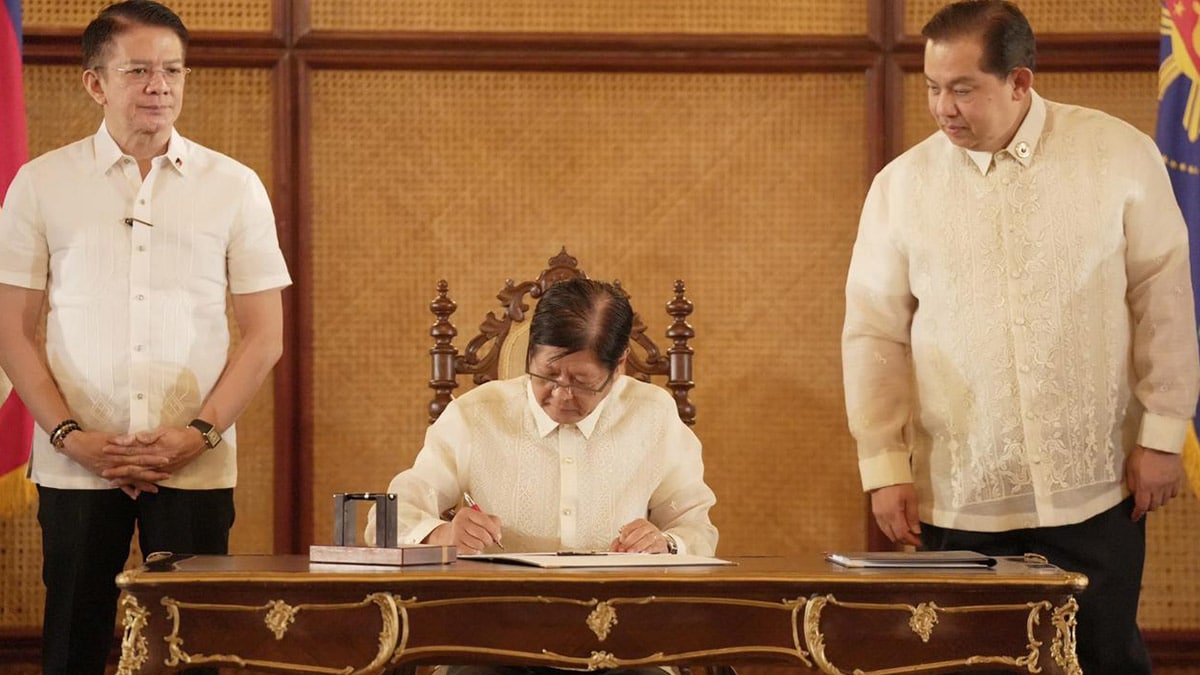
President Ferdinand “Bongbong” R. Marcos Jr. signs into law the Anti-Financial Account Scamming Act (AFASA) and the New Government Procurement Act during simple rites held Saturday morning at the Ceremonial Hall of Malacañang Palace. Among those who witnessed the event were Speaker Ferdinand Martin G. Romualdez and Senate President Chiz Escudero
MANILA, Philippines — President Ferdinand Marcos Jr. approved the New Government Procurement Act (NGPA) and the Anti-Financial Account Scamming Act (AFASA).
In a ceremony at the Malacañan Palace on Saturday, July 20, Marcos signed the NGPA or Republic Act 12009, which is a harmonized version of Senate Bill No. 2593 and House Bill No. 9648, that aims to address loopholes in the current government procurement system for a more economical and responsive process.
READ: New gov’t procurement bill will ensure transparency, efficiency – Angara
“The NGPA streamlines the procurement process from three months to just 60 days by standardizing procurement forms and institutionalizing electronic procurement,” Marcos said in his speech.
One of the significant features of the NGPA is the provision of 11 new modalities of procurement that will give government agencies greater flexibility in choosing ways to procure goods and services.
Moreover, the new law introduces the “Most Economically Advantageous Responsive Bid,” which evaluates both the qualitative and economic value of a proposal, as opposed to the current practice of selecting the “Lowest Calculated and Responsive Bid.”
On the other hand, AFASA or RA No. 12010, intends to protect Filipinos from online scams.
“This new law mandates financial institutions to implement necessary safeguards to protect our citizens’ accounts. It will protect our people from falling prey to perpetrators who target their banks and e-wallet accounts,” Marcos said.
“This is essential in this time as cybercriminals use technology to defraud fellow Filipinos — causing not only personal economic loss through them but also a loss of trust in financial institutions,” he added.
The Legislative Executive Development Advisory Council led by Marcos tagged the two laws as priority measures.
READ: House adopts Senate-approved Anti-Financial Account Scamming bill
In a separate statement, the Bangko Sentral ng Pilipinas (BSP) said it welcomes the passage of AFASA.
“We express our full support for the new anti-financial account scamming law. This will help us strengthen consumer protection and foster trust and confidence in the Philippine financial system,” said BSP Governor Eli M. Remolona, Jr.
AFASA authorizes the BSP to investigate cases that violate the law, apply for cybercrime warrants and orders, and request assistance from the National Bureau of Investigation and Philippine National Police in the investigation of cases.
It also allows the BSP to examine and investigate bank accounts, e-wallets, and other financial accounts that are involved in prohibited acts.


